

EDpuzzle: Video Tutorial. DigCompEdu: ma molto Meglio Bloom E le conoscenze?
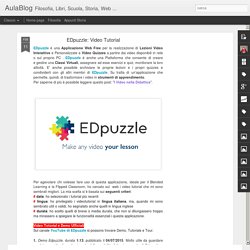
Plickers! – emedialab. Credo che tutti noi ci siamo appassionati di fronte ad un Kahoot ben costruito: vedere le domande, dare la propria risposta, aspettare con curiosità prima di scoprire la risposta corretta e poi di vedere la leaderboard, cercando di raggiungere il primo posto!
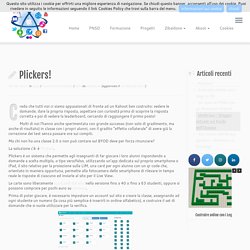
Molti di noi l’hanno anche sperimentata con grande successo (non solo di gradimento, ma anche di risultato) in classe con i propri alunni, con il gradito “effetto collaterale” di avere già la correzione dei test senza passare ore sui compiti. Ma chi non ha una classe 2.0 o non può contare sul BYOD deve per forza rinunciare?
Uno strumento per creare quiz online: Qzzr. Marie Delaney: Inclusive assessment approaches to learning in the English Language Classroom – I’m a teacher not a psychologist! Plickers. Make It Count: Providing Feedback as Formative Assessment. Providing students with feedback on written work can, at times, feel like a burden.
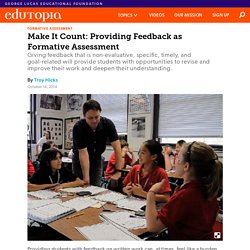
Dozens (perhaps even hundreds) of papers clutter your desk, and commenting on each is nearly impossible. Still, we know, both from our experiences and from research, that feedback is essential. John Hattie, Professor of Education and Director of the Melbourne Education Research Institute at the University of Melbourne, Australia, believes that feedback must be timely, relevant, and action-oriented.
Short videos about assessment - Engage in Assessment - University of Reading. Accessibility navigation University Of Reading.
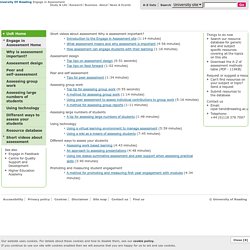
Assessment: Lower Stakes, Raise Retention. Assessment is a hot-button issue in today's K-12 education landscape, especially when one places the word "standardized" in front.
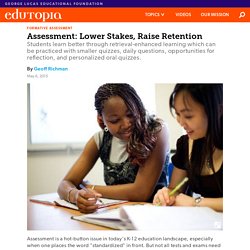
But not all tests and exams need raise hackles or blood pressure. Indeed, there is a certain kind of exam that has been shown to increase learning in the classroom without undue dread: low-stakes assessment. Retrieval-Enhanced Learning Henry Roediger III, professor of psychology at Washington University in St. Louis (WUStL) and author, with Mark McDaniel and Peter Brown, of Make It Stick: The Science of Successful Learning (2014), has conducted research showing that "tests serve students best when they're integrated into the regular business of learning and the stakes are not make-or-break, as in standardized testing. " Make It Count: Providing Feedback as Formative Assessment. Marie Delaney: Inclusive assessment approaches to learning in the English Language Classroom – I’m a teacher not a psychologist!
TeachingEnglish. EFL Assessment sheets. READI Oral Proficiency Criteria. Writing Rubric EFL - EXW3C34: RCampus. Litz - Student-directed Assement in ESL/EFL: Designing Scoring Rubrics with Students. The Internet TESL Journal David LitzUAE University (Al-Ain, United Arab Emirates)davidralitz(at)yahoo.com Introduction This paper will discuss and provide a useful example of "negotiable contracting" (Stix, 1997), an innovative assessment approach in ESL whereby students are actively involved in the construction or creation of rubrics prior to undertaking more complex language learning tasks.
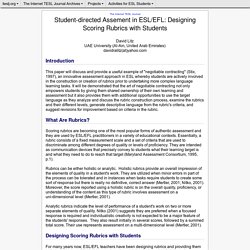
It will be demonstrated that the art of negotiable contracting not only empowers students by giving them shared ownership of their own learning and assessment but it also provides them with additional opportunities to use the target language as they analyze and discuss the rubric construction process, examine the rubrics and their different levels, generate descriptive language from the rubric's criteria, and suggest revisions for improvement based on criteria in the rubric. What Are Rubrics? Rubrics can be either holistic or analytic. 5- MED Come valutare un percorso MediaEducativo. Conduce Roberto Trinchero. 15421. AulaBlog. Tutorial su ForAllRubric. La Rubrica di valutazione. Six Tools for Creating Classroom Quiz Games - A Comparison Chart. Twice in the last week I have given presentations about tools for creating fun formative assessment activities.

The most popular part of that presentation is when we play a couple of quiz games in Kahoot and Socrative. Those are probably the best known quiz game platforms. They are not the only quiz game platforms. There are some other good ones. All of them have a common purpose, to make review fun, and all of them have some common features. The features that are common to all six platforms are: 1.
The chart embedded above is hosted on Box.com. Creative Ways to Grade and Provide Feedback for Students. Teachers work very hard to give all students as much feedback on their work as possible.
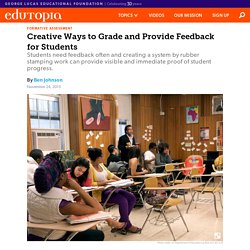
Unfortunately, there are limits to how much time a teacher can spend grading papers, writing notes, and encouraging students. For example, each day, students often complete warm-ups, sponge activities, or some other pre-lesson assignment while the teacher takes roll and sets up for the day's lesson. When I began my educational career as Spanish teacher, I quickly discovered that when some students realized the "sponge" work was rarely graded, they stopped doing it. My first reaction was to make it a graded activity. "Turn in all the warm-up papers" became less and less appealing to me as I realized that every time I said those words, I just doubled my pile of grading. Peer Grading Potential cheating diminished, but keeping thirty red pencils sharp became a chore.
Checking for Understanding The Efficiency of Rubber Stamping. Video tutorial ForAllRubrics: creare e usare Rubriche di Valutazione.